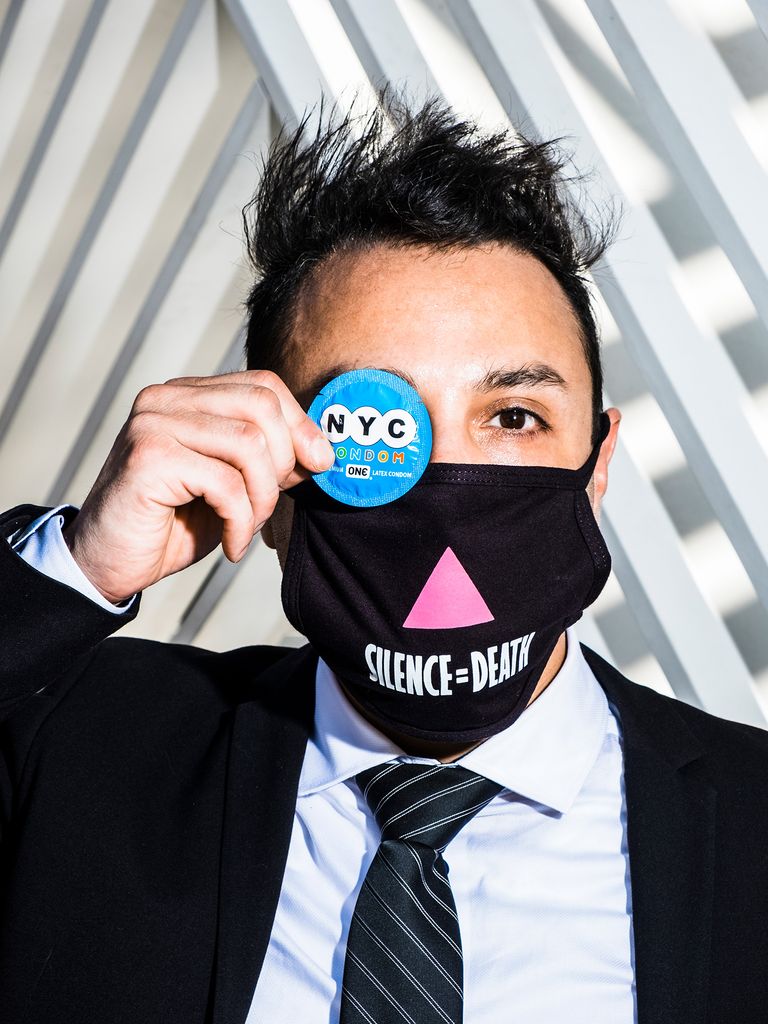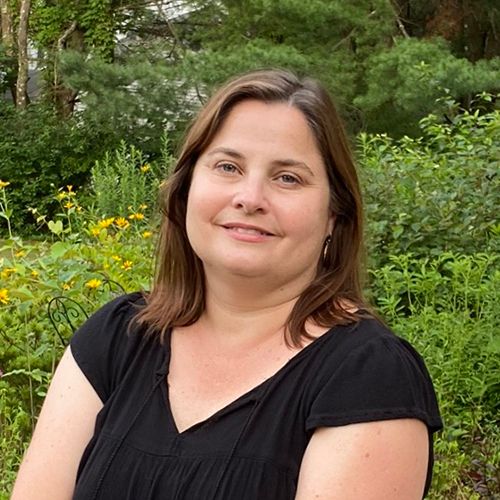How Advocacy Can Ease an Epidemic
In the New York City Health Department, Adrian Guzman ('11) oversees public policy related to HIV.

Photos by Chris Sorensen
How Advocacy Can Ease an Epidemic
In the New York City Health Department, Adrian Guzman (’11) oversees public policy related to HIV.
When Adrian Guzman’s (’11) team at the Bureau of HIV in the New York City Health Department released guidance on safer sex during the COVID-19 pandemic, he did not expect much of a response. As the bureau’s director of policy and external affairs, his goal was to acknowledge that sex and sexuality are important parts of people’s lives and to accurately respond to questions from the community on how to have safer sex and avoid spreading the virus. Since then, the guidelines have been featured on Jimmy Kimmel Live and Saturday Night Live and covered in media outlets like the Voice of America and the New York Times.
“I’m proud that this important information reached so many people and provided a much-needed moment of levity. This is the perfect example of how we approach our HIV-related work at the Health Department. We prioritize science over stigma and empower people to take control of their sex lives,” says Guzman, noting that the Bureau of HIV’s focus expanded to include COVID-19 during the pandemic.
He sees parallels between the COVID-19 pandemic and the early days of the HIV epidemic. “In both cases, the federal government failed to appropriately respond, allowing politics to interfere with protecting the public’s health,” he says. “We lost thousands of New Yorkers to AIDS due to willful inaction by the government, and we have worked hard to regain trust from the community. Activists demanding change, accountability, and a seat at the table are the reason we’ve made such progress toward ending the HIV epidemic.”

Guzman became interested in the intersection of public health and the law in college. “At the time,” he explains, “there was considerable political support for teaching abstinence-only sex education, despite robust evidence showing that this approach does not dissuade or even delay young people from being sexually active or reduce sexual risk behaviors. It was mind-boggling to me that many elected officials and policymakers were so dismissive of scientific evidence.”
As a student in the Master of Public Health program at Columbia University, he interned at the HIV Law Project and discovered a passion for HIV policy and advocacy. “I’d always been fascinated by state regulation of sex and sexuality, and I knew that any attempt to shift the culture toward one of greater equity and fairness would have to be based in both public health and the law, so law school was the logical next step.”
After graduating from BU Law, Guzman joined the Center for HIV Law & Policy, a national organization that works to modernize state HIV criminalization laws and sentence enhancements, as well as improve access to comprehensive, medically accurate sexual and reproductive healthcare for minors in state custody settings.
Now, with the Bureau of HIV at the New York City Health Department, he has helped establish public policy advocacy as a vital component of the city’s strategy to end the local HIV epidemic. “Preventing new HIV infections and improving the health and well-being of people with HIV isn’t just about testing, prevention, and treatment services—it’s also about ensuring that our laws and policies facilitate equitable delivery of these services absent stigma and discrimination,” he says.
Much of Guzman’s work focuses on protecting the Affordable Care Act (ACA), which the Centers for Disease Control and Prevention describe as “one of the most important pieces of legislation in the fight against HIV/AIDS in our history.” The ACA mandates coverage of essential health benefits and prohibits discrimination against people with preexisting conditions, such as HIV.
Guzman is also working to protect Medicaid and Medicare coverage for this population. He notes that Medicaid covers more than 40 percent of people with HIV who are in care, and Medicare covers approximately a quarter of people diagnosed with HIV, with the majority of beneficiaries with HIV dually eligible for both programs.
Preventing new HIV infections and improving the health and well-being of people with HIV isn’t just about testing, prevention, and treatment services—it’s also about ensuring that our laws and policies facilitate equitable delivery of these services absent stigma and discrimination.
Public comments and position statements have been powerful tools in this effort. For example, Guzman worked with the New York State Department of Health on amendments to the state health code allowing providers to administer HIV prevention and treatment services to minors without parental or guardian consent.
“It was exciting to see this work from beginning to end, from preparing surveillance data on new HIV diagnoses and viral load suppression among young people to soliciting community and provider feedback on what was and wasn’t working on the ground, and finally assessing the current legislative and regulatory landscape to propose the necessary amendments,” he says.
After the regulatory victory, his focus moved to promoting the new policy. “This work is only effective if young people most affected by HIV—particularly young Black and Latino gay and bisexual men and other men who have sex with men—are aware of their right to access these services without involving their parents. Their physicians, nurses, social workers, teachers, and health educators need to know this information as well.”
Guzman is also advocating for New York to take a leadership role in the movement to decriminalize consensual sex work. “Studies show that repressive policing practices linked to sex work criminalization are associated with increased risk of HIV and sexually transmitted infections, sexual or physical violence from clients or intimate partners, and condomless sex,” he says. “An increasing number of city and state elected officials are coming out in support of full—or at least partial—decriminalization of sex work in the state, and I’m determined to help move this along.”
Keeping in touch with community groups, he provides “snapshots” of current HIV-related litigation, legislation, regulations, and other policies, and helps them develop policy positions and strategies so they can advocate for themselves and their clients.
While battling the HIV epidemic is an ongoing fight, Guzman says there is good news. Last year, the New York City Health Department announced that the annual number of new HIV diagnoses reported in New York City in 2018 fell below 2,000 for the first time since HIV reporting began in 2001. Declines in new diagnoses from 2017 to 2018 were seen among men and women, all major racial and ethnic groups, residents of all boroughs, and nearly all age groups and HIV-transmission risk groups.
“These are important milestones, but until we see equitable progress among people with HIV from all walks of life, we must do more to fight the institutional racism, xenophobia, sexism, homophobia, transphobia, and other forms of stigma that put people at greater risk of HIV and put care and treatment further out of reach,” he says.
“To do this, we must have laws and policies in place that facilitate this and that prevent the rolling back of our hard-won gains. I’m grateful to be a part of this important work.”

